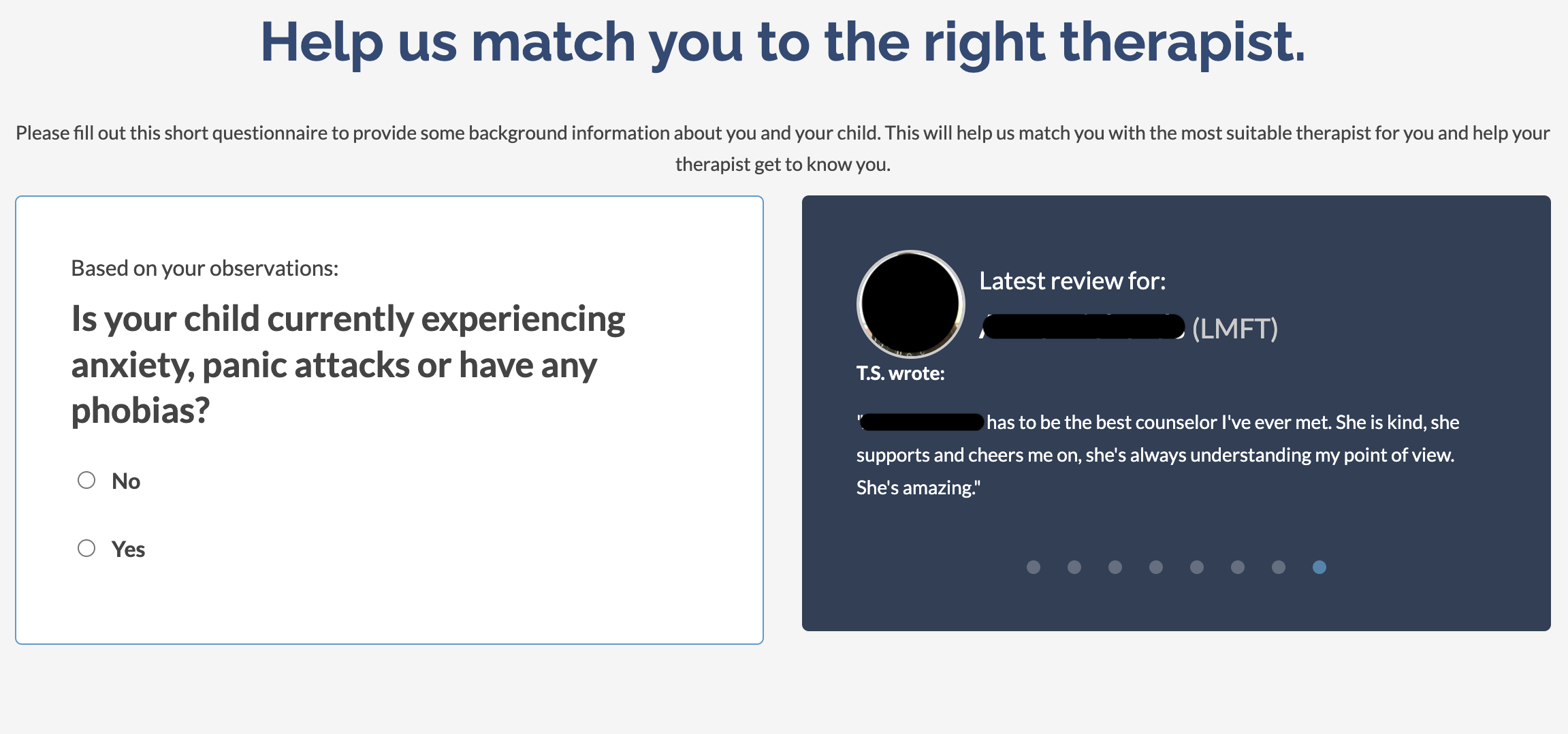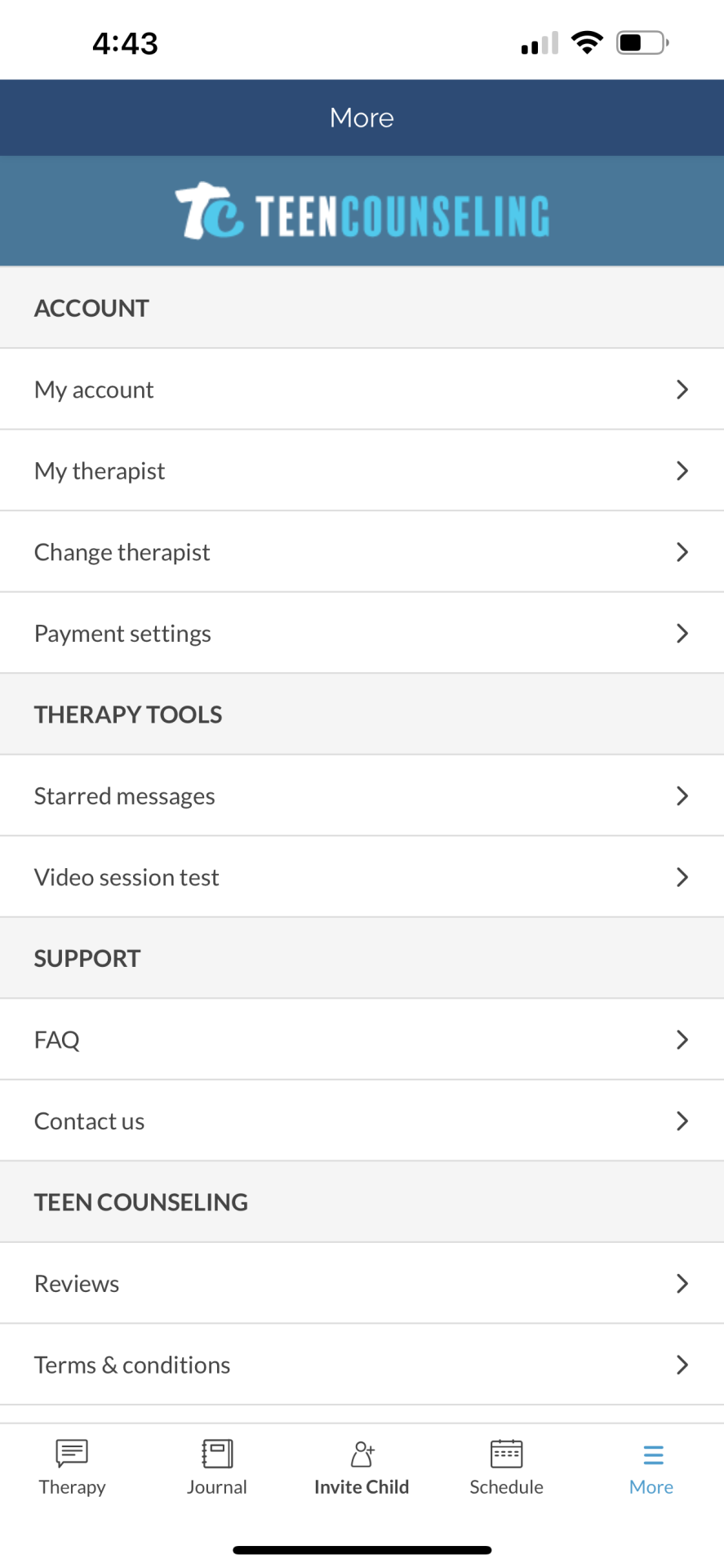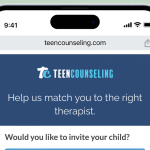Table of Contents
- The Handbook Team has spent more than 10,000 hours researching 70 online therapy platforms and personally testing 26 of them.
- We’ve surveyed 2,000 online therapy users, interviewed 30 online therapy users in focus groups, and consulted more than 60 experts, including licensed therapists, psychologists, and psychiatrists.
- To write this Teen Counseling review, we asked the parent of a teen to spend four weeks testing the platform. Our tester took detailed notes on the sign-up process, appointment availability, and the overall quality of the platform and therapists. We also asked teen online therapy users to complete an anonymous survey about their experiences.
- Learn more about how we tested Teen Counseling.
Key takeaways
- We recommend Teen Counseling because the easy sign-up process and frequent availability of appointments help make mental health care more accessible for adolescents.
- Teen Counseling costs $260–$360 per month. Insurance is not accepted, but you can pay with your flexible spending account (FSA) or health savings account (HSA) card.
- The Teen Counseling platform also provides parenting support for parents of teens.
If your teen is experiencing anxiety, depression, or another mental health challenge, you don’t want to wait weeks or months to get them help. The increase in demand for mental health treatment, including for young people, can often mean longer wait times.
Online therapy is one option for families seeking accessible mental health care for their teens, especially if they have transportation barriers or schedules that make it difficult to attend in-person sessions. Teen Counseling, which offers video, audio, and text sessions with licensed therapists, is the Handbook Team’s favorite platform for online therapy for teens.
Our Teen Counseling review provides insight on this platform’s approach to mental health care for 13–19 year olds. We surveyed parents and teens about their experience with Teen Counseling, asked teens about time spent in online therapy sessions, and closely monitored the experiences of our Teen Counseling testers. Find out if Teen Counseling is a good fit for your family.
Teen Counseling highlights
What is Teen Counseling?
Teen Counseling, a BetterHelp brand designed specifically for teens and parents of teens, is our top-rated online therapy platform for adolescents. The platform serves teens age 13–19, and also offers counseling services for parents who need parenting support, even if their teens aren’t receiving therapy on the platform.
A monthly subscription to Teen Counseling includes four live sessions with your therapist, which you can choose to attend via video, audio, or live chat. Between sessions, parents and teens can message their therapist and use the platform’s additional features, such as the digital journal and therapist-provided worksheets.
The Teen Counseling intake form asks questions that screen for attention-deficit/hyperactivity disorder (ADHD), anxiety-related disorders, and depression, three of the most commonly diagnosed mental health conditions in children. The two therapists a tester met with had multiple years of experience in treating teens, and one specialized in treating teen depression and anxiety disorders.

How does Teen Counseling work?
Teen Counseling has both a desktop version and an app, which works on both Android and iOS. To attend live weekly sessions with a licensed therapist, teens and parents can choose from live video, audio, or chat sessions. Sessions typically last 30–45 minutes, with session length varying according to the needs and preferences of each client. Appointments can be scheduled on both the desktop and app versions, but usually only one or two weeks in advance.
From one of our Teen Counseling testers:
“It’s pretty easy to find appointment times for each therapist and to book a time slot. We did notice that the therapists we worked with only showed availability two weeks out, and we would have liked the option to book a full month of appointments at one time.”
How to sign up for Teen Counseling online therapy
When you sign up for Teen Counseling, you’ll first be asked whether you’re seeking therapy for your teen or if you just want parenting support (you can also choose “decide later” if you’re not sure). From there, you’ll be asked a series of screening questions about symptoms and conditions your child may be experiencing (panic attacks, school challenges, and substance abuse, for example). Our tester likes that the platform also asks about the teen’s gender identity, with choices that include “non-binary,” “transfeminine,” and “transmasculine.”
After completing the intake form, you’ll answer a few questions about what you or your teen want to address in therapy and what you’re looking for in a therapist. Our tester was shown two alerts during the sign-up process. First, the platform affirms that online therapy is not appropriate for crisis situations. Second, the tester was told their messages might be reviewed by a different therapist (other than the one they were matched with) to help with guidance and support for their assigned therapist. Both of these alerts required the tester to “Accept” or “Decline” to move forward with registration.
Typically, a parent signs up for Teen Counseling and can then invite their teen, who will receive an invite code to login to the platform via email and text message. Interested teens can also use the platform to submit a request to their parents to be matched with a therapist.

How to match with an online therapist
Teen Counseling uses the responses on your intake form to match you with a compatible therapist. Our tester’s teen was matched with a therapist and made their first appointment within 24 hours of signing up. However, the first therapist’s availability wasn’t ideal for the teen’s schedule, with no appointments after 4 p.m. or on weekends. Our tester requested a new therapist and found a new provider by the next day. Both therapists had experience in the issues our tester indicated on the intake form.
When choosing an online therapist, child psychologist Caroline Danda reminds parents to look for the same high standards and professional training they’d look for in an in-person provider. “Both the parent and teen need to feel comfortable with the therapist’s style, approach, and expertise, regardless of the delivery format,” she says.
If you need to switch therapists on Teen Counseling, go to the account menu (in app or on desktop) and scroll down to “Change Therapist.” From there, you can search for a new therapist based on your needs and availability. Our tester found the process of switching therapists easy and productive. We like that transferring your care to a new therapist is built into the platform and that you don’t have to contact customer service to make the switch, as is the case with some online therapy platforms.
From one of our Teen Counseling testers:
“We requested to switch to a new therapist for appointment availability reasons. The new therapist had several years of experience, could accommodate weekend and evening appointments, and had experience in our teen’s specific area of concern.”
Live video, audio, and chat sessions
A Teen Counseling subscription comes with four live sessions per month. You can choose to attend these sessions via video, audio, or live chat session. Though parents can’t attend their teen’s sessions, they can communicate with the therapist by messaging them on the app. The parent cannot see their teen’s messages to their therapist, and vice versa.
Live video
Live video is the only way to communicate face-to-face with your Teen Counseling therapist. Our tester attended two video sessions with Teen Counseling therapists. In the first session, it was easy to sign on and to see and hear the therapist. However, the therapist’s camera was on a second monitor off to the side, which our tester says made it difficult to make eye contact. Though the therapist’s demeanor was warm, the lack of eye contact made it a little difficult to openly communicate. Our tester’s second video session was cut short by a technology glitch (the video software kept crashing, an issue the therapist says they deal with occasionally on the platform). Our tester notes that the therapist handled the issue professionally and finished the session via phone call.
Live audio
While phone calls (audio only) don’t offer the visual cues of facial expressions and body language, a 2022 review of studies that examined the effectiveness of phone versus video conferencing shows that audio conferences can play a role in treating anxiety, depression, and other mental health disorders. While our tester was frustrated when a video call crashed, their teen actually preferred the audio sessions to the video ones.
Live chat session
A live chat session is therapy delivered via text in the Teen Counseling app. In this online text therapy session, the therapist and teen message back and forth instantly at a scheduled time. For teens who are accustomed to frequent texting, this may be a comfortable way to communicate.
What other users are saying
In our February 2024 survey of 100 parents who used Teen Counseling, 78 percent of respondents somewhat or completely agreed that the platform’s sign-up process was quick and easy, 75 percent agreed that the therapist they were matched with met their teen’s needs and preferences, and 80 percent said the therapy their teen received met their expectations.
On an overall satisfaction scale of one to 10, with one being lowest and 10 being the highest, Teen Counseling earned an eight or above from 73 percent of respondents. Only 14 percent of respondents gave Teen Counseling a score below five.
How much does Teen Counseling cost?
A Teen Counseling subscription, which includes four live sessions per month and access to all of the platform’s features, costs $260–$360 per month, depending on therapist availability.
Is Teen Counseling covered by insurance?
Teen Counseling doesn’t accept any form of health insurance as payment, although you can pay for sessions using your HSA or FSA card. If you are you looking for online therapy covered by insurance, consider Talkspace or Brightside, two online therapy platforms that also serve teens.
How to save money on Teen Counseling
While you can’t use insurance to pay for Teen Counseling, its monthly fees may be a more affordable therapy option than some in-person options, unless you can find an in-person counselor who offers sliding scale fees. You can also use your HSA or FSA card to pay for services on Teen Counseling.
Our experience with Teen Counseling customer service
Our tester’s experience with Teen Counseling’s customer service team was positive. Before canceling their subscription, our tester contacted their therapist to let them know they’d decided to pursue in-person therapy for their teen. However, because our tester canceled one day after the billing cycle ended, they were still charged for a full month of services. When our tester emailed customer service to explain the situation, they heard back from Teen Counseling within 24 hours and were immediately issued a refund. Our tester was impressed that the email response came from a real person who applauded the tester’s decision to do what was right for their child.
Our Teen Counseling testing experience
The Handbook Team has spent more than 10,000 hours researching 70 online therapy platforms. We’ve tested 20 of these platforms ourselves and continue to add new therapy platforms to our testing schedule. Our comprehensive review of the online therapy landscape includes surveying thousands of online therapy users, conducting focus groups with online therapy users, and consulting with experts, including licensed therapists, psychologists, and psychiatrists.






How we tested the Teen Counseling platform
Our Teen Counseling tester spent four weeks exploring the online therapy platform with their teenager. This included signing-up for the platform, matching with and talking to therapists, and asking their teen about their own experiences with the platform.
We asked our tester to complete each of the following steps:
To better understand the online therapy experience for teens, we also conducted an anonymous survey of ten online therapy users between the ages of 13 and 18. We found that many teens prefer online therapy for the privacy and convenience; others prefer in-person therapy but say that online therapy is more realistic for their family’s schedule.
From our online teen therapy survey respondents:
“Another reason I like online therapy is you can have an appointment anywhere. For example, sometimes I’m at work, and I have to tell my manager about my appointment, and they don’t have a problem with me stepping off the floor for a little bit.” (Age 18)
“I prefer in person, but online is our only option right now due to our schedule.” (Age 11–13)
Compare Teen Counseling to other online therapy platforms
Teen Counseling’s monthly costs (for live sessions) are more affordable than Talkspace and Brightside. However, Teen Counseling does not take insurance, which often has copays that are much lower and can make therapy sessions more affordable for families.
Therapists on the Teen Counseling platform cannot provide psychiatric evaluations or prescribe medication. For this kind of treatment, teens and their families should see an in-person psychiatrist or investigate a platform like Brigthside, which offers has both online therapists and telehealth psychiatrists.
| Out-of-pocket monthly cost | $260–$360 | $260–$400 | $276–$725 | $95–$349 | $228–$360 |
| Insurance accepted? | No | No | Yes | Yes | No |
| Services | Individual therapy for teens and parents | Individual therapy | Individual therapy for teens and adults; couples; psychiatry; medication management | Individual therapy for teens and adults; psychiatry; medication management | Individual counseling |
| Ways to connect | Live phone, video, or chat sessions; text messaging | Live phone, video, or chat sessions; text messaging | Live phone, video, and chat sessions; text messaging | Live video and chat sessions; text messaging | Live video sessions; text messaging |
| App | Yes | Yes | Yes | Yes | Yes |
In a mental health emergency
In a mental health emergency:
Online therapists may not be the most appropriate resource to help in a mental health crisis. If you or someone you know is a danger to themselves or others, it is an emergency and cannot wait for an online therapist’s response.
Don’t wait. You can find help immediately by:
- Visiting urgent care.
- Calling or texting 988 for the Suicide & Crisis Lifeline.
- Chatting online at 988lifeline.org.
- Calling the Substance Abuse and Mental Health Services Administration’s (SAMHSA) Helpline at 800-662-4357 or texting your zip code to 435748.
- Calling The Trevor Project at 888-488-7386 or texting START to 678-678 to talk with trained professionals who understand the challenges faced by LGBTQ youth.
All of the above options will connect you with trained professionals who can provide crisis support. You can find even more resources, including international options, on our helpline directory page.
Our final verdict
Teen Counseling can be a good option for busy families who are seeking an accessible mental health care option for their teen. While the platform’s main offering is individual therapy for teens, parents can also use the platform to get parenting support from licensed therapists who specialize in teen issues. Though parents can’t join their teens during sessions, they can communicate with the therapist in the Teen Counseling app. We like that the platform serves adolescents while also prioritizing family involvement in the therapeutic process, which is why we included the platform our review of the best online family therapy platforms.
Our testers say it’s easy and quick to sign up for Teen Counseling and get started with a therapist, although it may take a couple of tries to find a therapist who fits your schedule. While our tester ran into a few scheduling and technology issues, they had an overall positive experience with the platform’s interface, therapists, and customer service team.
Online counseling is not for adolescents who are having a mental health crisis, but Teen Counseling may be a good option for teens and their families who are looking for mental health care with short wait times and qualified therapists.
Frequently asked questions
The Teen Counseling online therapy platform serves teens age 13–19 and their parents or guardians.
No, Teen Counseling providers cannot prescribe medications. Our best online psychiatry page details which platforms can prescribe medications for teens.
A monthly subscription to Teen Counseling, which includes four live video, audio, or chat sessions, is $260–$360 per month, depending on therapist availability where you live.
On Teen Counseling, teens are matched to a therapist who meets their needs and preferences after filling out the platform’s intake questionnaire, which asks about the teen’s symptoms, conditions, and identity. If you don’t like the therapist you’re matched with or have scheduling problems, it’s easy to switch to another therapist through the platform.
- American Psychological Association. (2022, November). Psychologists struggle to meet demand amid mental health crisis. Link
- Centers for Disease Control and Prevention (CDC). (2023, March 8). Data and Statistics on Children’s Mental Health. Link
- Chen, P. V., Helm, A., Caloudas, S.G., Ecker, A., Day, G., Hogan, J., & Lindsay, J. (2022, September 2). Evidence of Phone vs Video-Conferencing for Mental Health Treatments: A Review of the Literature. Current Psychiatry Reports, 24(10), 529–539. Link











